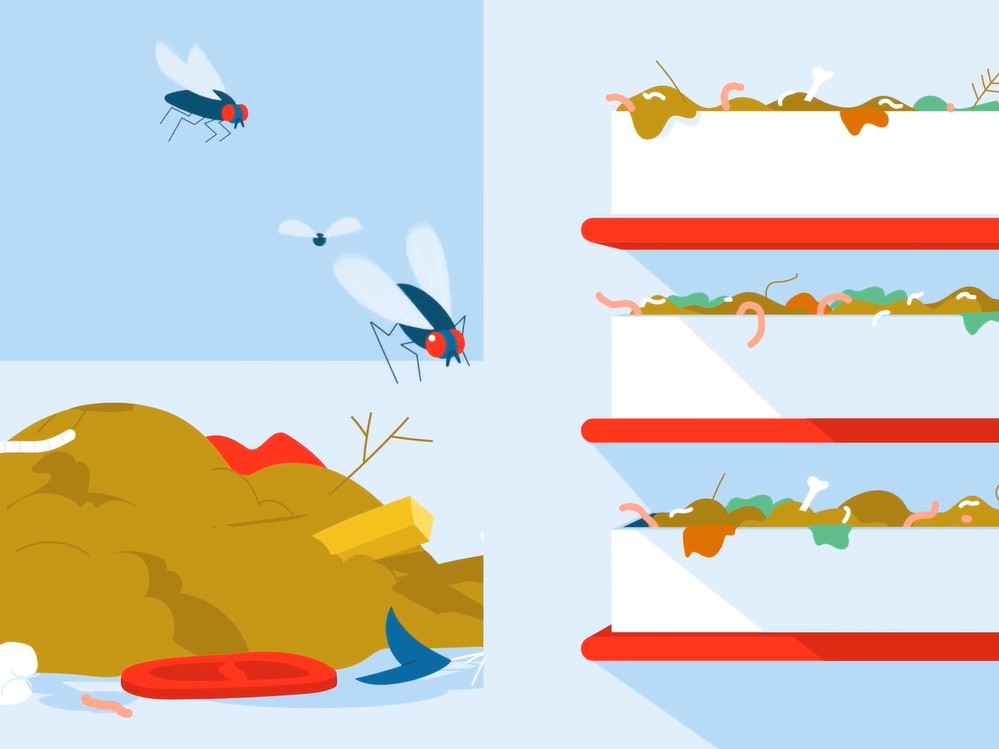Can New Technologies Help Europe Get A Taste For Insects?
Even though insects are consumed by at least 2 billion people, most Europeans turn their noses up at the idea. This might be about to change however. Experts predict that an upcoming ruling from the EU’s European Food Safety Authority, in which the sale of insect-based food products will be liberalised, could see them finally hit the mainstream. Accordingly, interest in mass rearing systems and technologies is growing. Within the SCALIBUR project, researchers are developing a new circular economy concept whereby flies are reared on food waste from restaurants, before being processed into food, feed and other products. We spoke to Andrea Antonelli from the University of Modena and Reggio Emilia, Department of Life Sciences to find out more. Where did the idea come from to rear insects on food waste? Of the 90 million tons of food wasted each year in the EU, about 10 comes from food services, so called HORECA (hotels, restaurants, and cafés). This is a huge amount of still quite high-value organic substances which is going to waste. The black soldier fly (BSF) naturally feeds on these kinds of organic substrates. So following the concept of biomimicry, we feed them this waste; transforming a problem into a resource with relatively low energy inputs. Can you tell us more about the process you are developing? UNIMORE has teamed up with Italian company Kour Energy to develop a start-to-end insect rearing process to obtain valuable products (protein, lipids and chitin) in a very efficient way, using high-tech chemical fractionation. We are merging biological knowledge for the best rearing practices, with chemical expertise for a high-yield extraction of products, and design and engineering practices to develop two pilot plants able to perform the whole transformation from waste to valuable materials. What are the main challenges you face with the process development? The greatest challenge for us is regulatory. In the EU it is currently not allowed to use anything that is defined as ‘waste’ (including, by extension, insects reared on food waste) as feed for animals. This is our main barrier to industrialise the process. In addition, there is a continuing caution over the acceptance of insects as potential sources of feed or food in Western culture. In fact, many people refuse this idea and in general are not aware of the crucial importance of insects for human life on earth and ignore the potential that could be exploited by combining their biology with new technologies. How would the process you are developing work on an industrial scale? We expect the results of SCALIBUR will prove that it is possible to use insect larvae for effective and safe biowaste conversion, and then show the relevance of the technology for industrial scale use. The first small-to-medium scale plants will start to be developed and will work with vegetable by-products to start with, rather than actual waste. As soon as organic waste becomes legal for insect feeding, industrial exploitation will see the interest of some big players in the environmental services sector as well, opening the way for large scale processing facilities. What is UNIMORE’s role in all this? The university has two main important roles. The first is related to the design of the plants. We explain the needs and behaviours of insects and the requirements for their chemical fractionation to Kour Energy, who translate all this information into functional plants. Another project partner, Zetadec, have also helped to optimise the fractionation process. Our second role is in explaining and promoting the uptake of these plants throughout the territory, especially nearby the producers of insect-suitable out-streams. Watch the video at: https://youtu.be/XOZaqwj-tRI(opens in new window) Find out more at: www.scalibur.eu/from-retail-food-waste/ http://personale.unimore.it/rubrica/pubblicazioni/antonelli(opens in new window)



